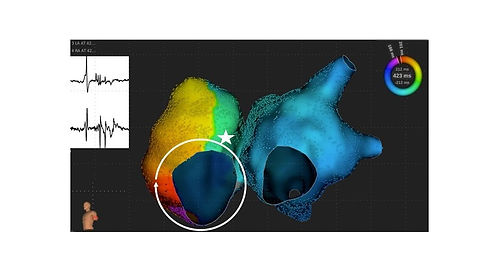Research Interests
Mechanisms and ablation of ventricular arrhythmias
- First clinical use of novel DirectSense ablation catheter (Boston Scientific), which can provide contact information to aid effective lesion formation
- First use of novel 'Lumipoint' mapping algorithms (Boston Scientific), aiding identification of isthmuses in tachycardia circuits
- Assessment of VT mechanisms in Brugada Syndrome and ARVC
- Assessment of ECG-i mapping system, EC-VUE (Medtronic) in VT and AF ablation

Mechanisms and ablation of atrial arrhythmias
- Mechanistic studies of characteristics of macro-entrant ATs
- Assessment of novel algorithms for Carto (Coherence) and Ensite Precision (HD Grid)
- Assessment of AF mapping technology: Acumap (Acutus), Constellation (Boston Scientific), FIRM (Topera), Cartofinder (Biosense)
- Outcome of persistent AF ablation

Inherited Cardiac Conditions
- Outcomes following S-ICD implantation
- Assessment of isoproterenol testing in ARVC
- Multi-national study of risk stratification in Brugada Syndrome
- Assessment of aetiology of AF in the young

Congenital heart disease
- Multinational study assessing outcomes of AT ablation in congenital heart disease

Devices
- Assessment of rates of adverse events and success rates in lead extraction

Left atrial appendage closure
- Use of 3D printed models of the left atrium to aid pre-procedural planning

Basic science research
- Mechanisms of excitation contraction coupling in muscle fibres
- Cellular mechanisms of ventricular arrhythmogenesis using genetic mouse models
